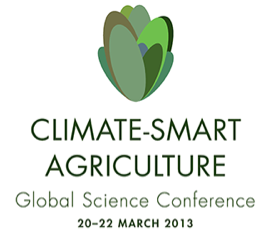At the 2013 Science Meeting of Climate Change, Agriculture and Food Security (CCAFS) program, almost seventy scientists from the CCAFS program discussed approaches to scale up the impact of their research and pilot initiatives.
 22 March 2013: The Global Science Conference on Climate-Smart Agriculture, which took place at the University of California, Davis, US, brought together over 300 participants to discuss science-based solutions that use knowledge systems in new ways to increase the resilience of food systems and ecosystem services in agricultural landscapes in the context of future uncertainty on climate change and extreme events.
22 March 2013: The Global Science Conference on Climate-Smart Agriculture, which took place at the University of California, Davis, US, brought together over 300 participants to discuss science-based solutions that use knowledge systems in new ways to increase the resilience of food systems and ecosystem services in agricultural landscapes in the context of future uncertainty on climate change and extreme events.
At the Conference, which was held from 20-22 March 2013, a number of representatives from the Consultative Group on International Agricultural Research (CGIAR) presented their work. A representative of the International Water Management Institute (IWMI) highlighted water shortage examples from Chile, noting approaches to address water scarcity including improving irrigation efficiency, better water storage and recycling processes, and more efficiency in water use. Describing climate change in agriculture as a “wicked problem,” Andy Jarvis of the Climate Change, Agriculture and Food Security (CCAFS) Program called for “translating complexity into actionable and understandable options” by developing robust processes for large investments in climate-smart agriculture.
Prior to the Global Science Conference on Climate-Smart Agriculture, CCAFS held its 2013 Science Meeting, bringing together approximately 70 scientists from the program to discuss approaches to scale up the impact of their research and pilot initiatives. The meeting, which was held from 18-19 March 2013, in Bodega Bay, US, examined approaches to achieve larger impacts on climate change adaptation and mitigation in the agriculture sector, particularly through social learning approaches and participatory work.
Participants stressed the need to reach the hundreds of millions of small-scale farmers globally, and highlighted the importance of considering farmers as collaborators, as opposed to recipients in development work. They shared experiences of working with agro-pastoralists in East Africa to develop a framework of community facilitator-researchers working on bridging the gap between research and action. Other scientists shared stories on the use of crowdsourcing, social media and traditional media to share messages for transformational change. [Global Science Conference on Climate-Smart Agriculture Website] [CCAFS Blog on Water Shortage and Climate Change] [CCAFS Blog on Climate Change and Agriculture] [CCAFS 2013 Science Meeting Overview] [CCAFS Video on Transformative Partnerships for a Food-Secure World] [CCAFS Blog Post on Meeting Discussions] [CCAFS Climate Change and Social Learning Website]